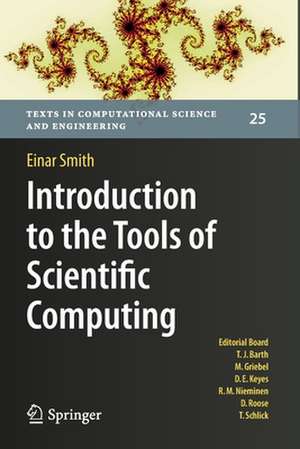Introduction to the Tools of Scientific Computing: Texts in Computational Science and Engineering, cartea 25
Autor Einar Smithen Limba Engleză Paperback – 4 dec 2021
In general, new concepts are first introduced in the particularly user-friendly Python language and then transferred and expanded in various scientific programming environments from C / C ++, Julia and MATLAB to Maple. This includes different approaches to distributed computing.
The fact that different languages are studied and compared also makes the book useful for mathematicians and practitioners trying to decide which programming language to use for which purposes.
| Toate formatele și edițiile | Preț | Express |
|---|---|---|
| Paperback (2) | 391.61 lei 6-8 săpt. | |
| Springer International Publishing – 4 dec 2021 | 391.61 lei 6-8 săpt. | |
| Springer International Publishing – 29 oct 2023 | 396.62 lei 6-8 săpt. | |
| Hardback (1) | 503.74 lei 6-8 săpt. | |
| Springer International Publishing – 28 oct 2022 | 503.74 lei 6-8 săpt. |
Din seria Texts in Computational Science and Engineering
- 15%
 Preț: 595.86 lei
Preț: 595.86 lei -
 Preț: 400.26 lei
Preț: 400.26 lei - 19%
 Preț: 544.68 lei
Preț: 544.68 lei - 4%
 Preț: 466.33 lei
Preț: 466.33 lei - 20%
 Preț: 325.00 lei
Preț: 325.00 lei - 20%
 Preț: 588.56 lei
Preț: 588.56 lei -
 Preț: 389.11 lei
Preț: 389.11 lei -
 Preț: 416.01 lei
Preț: 416.01 lei -
 Preț: 430.21 lei
Preț: 430.21 lei -
 Preț: 439.07 lei
Preț: 439.07 lei -
 Preț: 451.55 lei
Preț: 451.55 lei -
 Preț: 494.11 lei
Preț: 494.11 lei - 15%
 Preț: 608.08 lei
Preț: 608.08 lei -
 Preț: 394.87 lei
Preț: 394.87 lei -
 Preț: 393.90 lei
Preț: 393.90 lei -
 Preț: 387.75 lei
Preț: 387.75 lei -
 Preț: 504.50 lei
Preț: 504.50 lei -
 Preț: 396.62 lei
Preț: 396.62 lei -
 Preț: 482.45 lei
Preț: 482.45 lei - 20%
 Preț: 338.03 lei
Preț: 338.03 lei -
 Preț: 498.91 lei
Preț: 498.91 lei -
 Preț: 398.35 lei
Preț: 398.35 lei -
 Preț: 390.84 lei
Preț: 390.84 lei
Preț: 391.61 lei
Nou
Puncte Express: 587
Preț estimativ în valută:
74.96€ • 81.45$ • 63.01£
74.96€ • 81.45$ • 63.01£
Carte tipărită la comandă
Livrare economică 21 aprilie-05 mai
Preluare comenzi: 021 569.72.76
Specificații
ISBN-13: 9783030608101
ISBN-10: 3030608107
Pagini: 344
Ilustrații: XII, 344 p. 40 illus., 33 illus. in color.
Dimensiuni: 155 x 235 mm
Greutate: 0.5 kg
Ediția:1st ed. 2020
Editura: Springer International Publishing
Colecția Springer
Seria Texts in Computational Science and Engineering
Locul publicării:Cham, Switzerland
ISBN-10: 3030608107
Pagini: 344
Ilustrații: XII, 344 p. 40 illus., 33 illus. in color.
Dimensiuni: 155 x 235 mm
Greutate: 0.5 kg
Ediția:1st ed. 2020
Editura: Springer International Publishing
Colecția Springer
Seria Texts in Computational Science and Engineering
Locul publicării:Cham, Switzerland
Cuprins
Introduction.- Part I, Background.- Part II, Core Languages.- Part III, Commercial Computing Environments.- Part IV, Distributed Computing.- Part V, Specialized Programming Environments.- References.- Index.
Notă biografică
Einar Smith holds academic degrees in Mathematics from the Unversity of Bonn, in Economics from the University of Oslo, and in Computer Science from the University of Hamburg.
He has published a textbook on Mathematical Computability Theory, and a biography of the German computer scientist C.A. Petri. Both books have been published by Springer. In recent years he has mainly been concerned with the teaching of numerical methods at the University of Bonn, with an emphasis on computer programming.
Textul de pe ultima copertă
The book provides an introduction to common programming tools and methods in numerical mathematics and scientific computing. Unlike widely used standard approaches, it does not focus on any particular language but aims to explain the key underlying concepts.
In general, new concepts are first introduced in the particularly user-friendly Python language and then transferred and expanded in various scientific programming environments from C / C ++, Julia and MATLAB to Maple. This includes different approaches to distributed computing.
The fact that different languages are studied and compared also makes the book useful for mathematicians and practitioners trying to decide which programming language to use for which purposes.
In general, new concepts are first introduced in the particularly user-friendly Python language and then transferred and expanded in various scientific programming environments from C / C ++, Julia and MATLAB to Maple. This includes different approaches to distributed computing.
The fact that different languages are studied and compared also makes the book useful for mathematicians and practitioners trying to decide which programming language to use for which purposes.
Caracteristici
Programming concepts are always introduced in well-known mathematical contexts- Numerical algorithms and applications are used as examples, rather than as main topics Surveys and compares many different languages Didactically, concepts once understood, are then carried over to various other languages - helpful for mathematicians and practitioners who are trying to decide which programming language to use for which purposes
Recenzii
“This book covers a lot of ground, and overall it does so very well. … On nearly every page, the reader can find numerous code snippets … that are explained in great detail. … I can warmly recommend it to my colleagues and STEM students as a welcome resource to help them with this decision tree.” (Andreas Mang, SIAM Review, Vol. 64 (2), June, 2022)
